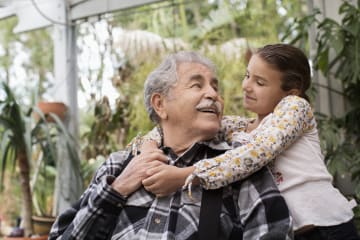
Your Recovery
Radiation therapy is a treatment to destroy cancer cells or shrink tumors. One type of radiation therapy is brachytherapy (say "bray-kee-THAIR-uh-pee"). It puts the radiation source into your body, either inside the tumor or next to it.
Brachytherapy may be used to treat prostate cancer. You may have a low-dose or high-dose treatment.
The area where you had radiation may be sore for a while. You may also have some swelling. It's normal to have some blood in your semen.
Most side effects go away after treatment ends. Side effects include trouble or pain when urinating and diarrhea. But you may feel very tired for 4 to 6 weeks after your last treatment. Tell your doctor if you have problems with a specific side effect.
If you have high-dose-rate treatments, you may need to stay in the hospital until your treatments are finished.
Your doctor will tell you if you need to keep children and pregnant people at a distance for any amount of time because of the radiation you were given.
Your doctor may give you instructions on when you can do your normal activities again, such as driving and going back to work.
This care sheet gives you a general idea about how long it will take for you to recover. But each person recovers at a different pace. Follow the steps below to get better as quickly as possible.
How can you care for yourself at home?
 Activity
Activity
- Rest when you feel tired.
- Be active. Walking is a good choice.
- Allow your body to heal. Don't move quickly or lift anything heavy until you are feeling better.
- Follow your doctor's instructions about sexual activity while you're healing.
 Diet
Diet
- You can eat your normal diet. If your stomach is upset, try bland, low-fat foods like plain rice, broiled chicken, toast, and yogurt.
 Medicines
Medicines
- Your doctor will tell you if and when you can restart your medicines. The doctor will also give you instructions about taking any new medicines.
- Be safe with medicines. Read and follow all instructions on the label.
- If the doctor gave you a prescription medicine for pain, take it as prescribed.
- If you are not taking a prescription pain medicine, ask your doctor if you can take an over-the-counter medicine.
 Ice
Ice
- Put ice or a cold pack on the area for 10 to 20 minutes at a time to help with soreness or swelling. Put a thin cloth between the ice and your skin.
 Other instructions
Other instructions
- Avoid sitting on hard seats (such as bicycle seats) for a couple of months after treatment.
- You may get instructions on caring for the area where the treatment was done.
Follow-up care is a key part of your treatment and safety. Be sure to make and go to all appointments, and call your doctor if you are having problems. It's also a good idea to know your test results and keep a list of the medicines you take.
When should you call for help?
Call 911 anytime you think you may need emergency care. For example, call if:
- You passed out (lost consciousness).
Call your doctor now or seek immediate medical care if:
- You have a fever.
- You have shaking chills.
- You have bleeding from your rectum.
- You have new or worse pain.
- You think you have an infection.
- You have new symptoms, such as a cough, belly pain, vomiting, diarrhea, or a rash.
- You can't pass urine.
- You have new or more blood clots in your urine. (It is normal for the urine to be pink for a few days.)
Watch closely for changes in your health, and be sure to contact your doctor if:
- You do not get better as expected.
Where can you learn more?
Go to http://www.healthwise.net/patientEd
Enter B120 in the search box to learn more about "Internal Radiation Therapy (Brachytherapy) For Prostate Cancer: What to Expect at Home".
Current as of: October 25, 2024
Author: Ignite Healthwise, LLC Staff
Clinical Review Board
All Ignite Healthwise, LLC education is reviewed by a team that includes physicians, nurses, advanced practitioners, registered dieticians, and other healthcare professionals.

